 MyDogBreeds
MyDogBreedsMuggin is originated from United States but North Country Beagle is originated from United Kingdom. Muggin may grow 31 cm / 12 inches shorter than North Country Beagle. Muggin may weigh 11 kg / 25 pounds more than North Country Beagle. Both Muggin and North Country Beagle has almost same life span. Both Muggin and North Country Beagle has almost same litter size. Muggin requires High maintenance. But North Country Beagle requires Low maintenance
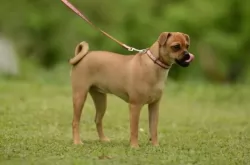 The Muggin is not a purebred dog but rather a cross breed. The hybrid dog population has exploding in the United States in the past ten to fifteen years. A lot of the success of crossbreeding can be attributed to the marketing of these dogs as “Designer Breeds”.
The Muggin is not a purebred dog but rather a cross breed. The hybrid dog population has exploding in the United States in the past ten to fifteen years. A lot of the success of crossbreeding can be attributed to the marketing of these dogs as “Designer Breeds”.
Designer breeds are developed because someone wants some of the characteristics of Breed X and some of the characteristics of Breed Y. Therefore, Designer breed XY is developed. In order to understand this hybrid dog, you need to understand the two purebred breeds they come from. The Muggin is the result of crossing the purebred Pug and the purebred Miniature Pinscher or Min Pin. So, we need to look at the origins of these two purebred breeds.
They are also referred to as Pin Pugs, Min Pin Pug, Pug Pin, Pugscher and were originally the Carlin Pinscher. However, these days there are other breeds besides the Pug and Min Pin making up the gene pool for the Carlin Pinscher. Because of this the Muggin has been separated from the Carlin Pinscher. The American Canine Hybrid Club has accepted the Muggin name for the Pug Min Pin cross.
Pugs are originally a Chinese breed and they were companions rather than working dogs of any kind. During the Han Dynasty they were the dogs of royalty. At the same time there were dogs very much like the pug in Japan and Tibet. The Pugs came to Europe by way of trades with the Dutch who then brought them to Europe. They were named the Mopshond and they caught the eye of the royalty in Europe as well.
Pugs were imported to the United States after the U.S. Civil War and in 1885 they were recognized by the American Kennel Club and called Pugs.
The Min Pin traces its origins to Germany a few hundred years ago. They were “ratters”, guarding the house and stables from all types of vermin. Most dog people believe that the Min Pin is much older than this, perhaps by thousands of years. Yet there is no detailed history to support that. Most believe the breed comes from the German Pinscher line. There might also be some Daschund and Greyhound in that line.
They were once called the Reh Pinscher. This was their name when they came to North America in 1919 and then the breed was renamed in 1972. The Miniature Pinscher Club of America was started in the early 1900’s while the AKC recognized the Min Pin in 1929. Today the Miniature Pinscher is a family dog, a companion.
The Muggin is a loving and loyal dog. All they want is for you to be happy and to share that happiness with them. They can also easily become a one person dog and bond intensely with that one person. They are not a hybrid that you can leave home alone while you go to work for 8 to 10 hours a day. No, the Muggin needs attention and lots of it. Despite this they are great with both kids and other dogs.
Because they are a cross breed, they are not recognized by the American Kennel Club. However, some hybrid registries do recognize the Muggin. These include the Designer Breed Registry, the International Designer Canine Registry, The Designer Dogs Kennel Club, the American Canine Hybrid Club, and the Dog Registry of America.
Known also as the Northern Hound or the Northern Beagle, the North Country Beagle hailed from Britain and is extinct.
It hailed more specifically from- and was native to the Yorkshire and Northumberland regions of England. As a scenthound it was known for its hunting skills.
There isn’t much known about the dog but it is one of England’s oldest hound breeds, with much of its ancestry been lost. There are many theories surrounding the origins of this dog. Also, the date at which the North Country Beagle was developed is also debatable but it has always been a good hunter.
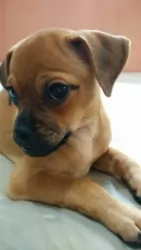 As previously mentioned, the Muggin is a cross between the Pug and the Miniature Pinscher. They are small, shave sturdy legs, floppy ears, and a wrinkled forehead for the most part. Like all hybrids however, all first generation dogs do not look the same. Some might resemble the Min Pin more and others the Pug. Some might have the stockier body of the Pug and the short tail of the Min Pin. Or one could have the Pug’s curly tail and the athletic body of the Min Pin. The snout can be short or long, the ears heavy and floppy or small and thin.
As previously mentioned, the Muggin is a cross between the Pug and the Miniature Pinscher. They are small, shave sturdy legs, floppy ears, and a wrinkled forehead for the most part. Like all hybrids however, all first generation dogs do not look the same. Some might resemble the Min Pin more and others the Pug. Some might have the stockier body of the Pug and the short tail of the Min Pin. Or one could have the Pug’s curly tail and the athletic body of the Min Pin. The snout can be short or long, the ears heavy and floppy or small and thin.
Their coats will usually be fine and short, and colors can vary a lot. They might be black and tan like a Min Pin, or more like a Pug with a solid color of cream, brown, black, white or golden. They also tend to shed quite a bit no matter which parent they take after the most. They will either have brown noses and black eyes or brown eyes and black noses or any combination of black and brown.
If Muggins are only bred to Muggins the second and third generations will resemble each other more than the first generations will. However, at this point many breeders will try to strengthen the breed by occasionally adding in to the gene pool other dog breeds.
The North Country Beagle seemed to vary quite a bit in size and because there isn’t much information on this extinct dog, we can assume he was much the same size of the Beagle we know today which is roughly 33 – 45cm in height and weighing between 9 and 11kg.
Not much is known about the dog’s appearance but it is believed that it looked much like the Southern Hound and English Foxhound. It was likely a medium sized dog with longish ears, thick bones but always agile and athletic.
There is very little known on what this dog’s temperament was like. He was strong willed and if you owned such a dog you would have had to have him trained and socialized. It was a dog that showed very little signs of aggression. It seemed the dog was friendly, social and loving to his human family.
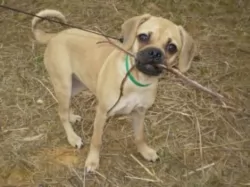 They are good with children but should be supervised.
They are good with children but should be supervised.
Energetic and loving little dogs.
Very adaptable if taken for walks or has space in a yard. Can live anywhere under those circumstances.
Very intelligent but strong willed dog. Needs strong leadership from their person.
The North Country Beagle was a social, energetic dog who loved spending time with his human family. They were intelligent too, so training and socialization were possibly easy for him.
They weren't regarded as raucous kind of dogs and were fairly quiet. They were quite social and didn't like being left alone for too long. They were adaptable too, slotting quite easily into country- or city life.
Coolish with strangers, the North Country Beagle made a good pet and companion with a generally happy, contented disposition.
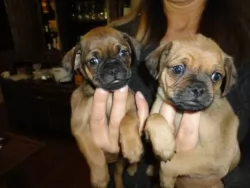 The first generation of Muggins may face all the health issues of either or both their parents, while second and third generations tend to have less health issues, They types of issues the first generation of Muggins might face include:
The first generation of Muggins may face all the health issues of either or both their parents, while second and third generations tend to have less health issues, They types of issues the first generation of Muggins might face include:
Nerve Degeneration – Degenerative Myelopathy or Dm – causes paralysis and eventually fatal.
The North Country Beagle had a lifespan of 12 to 15 years, and while he was a fairly healthy dog breed, there were some common health issues to look out for. Some of these were patellar luxation, epilepsy and glaucoma.
This is a condition where there is pressure in the eye and where there is inadequate fluid drainage as well. Left untreated, it can lead to permanent damage to the optic nerve which can lead to blindness.
It is fairly common in certain breeds. There is primary and secondary glaucoma and symptoms for instance with primary glaucoma can be this high pressure within the eye and also a cloudy appearance in front of the eye along with redness of the blood vessels and dilated pupils. There can also be headaches and loss of appetite.
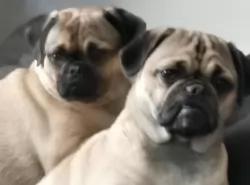 This crossbreed has a definite propensity to overeat and become obese from puppyhood. Feed the puppy a small dog dry food 3-4 times a day a total of ¾ of a cup to 1 cup.
This crossbreed has a definite propensity to overeat and become obese from puppyhood. Feed the puppy a small dog dry food 3-4 times a day a total of ¾ of a cup to 1 cup.
Again don’t over feed the adult Muggin or he will become obese easily. Feed at least twice a day one to one and half cups total.
High Energy
With the athleticism of the Min Pin taking precedence over the less active Pug, the Muggin is a fairly active dog. The Muggin is also not effective by the Pug’s difficulty with heat and cold. They love to go on long walks and need exercise to keep from being bored and destructive. However, remember there is a Pug in your Muggin and if she is not into exercise don’t try to get her to do more than she can.
You do want your Muggin to get enough exercise to fend off any tendency to be overweight. They are good at agility, jogging, obedience and watchdog activities.
Your North Country Beagle was a social animal and he always had a whole lot of love and friendship to offer his human family.
Today, if you bring such a dog into your home, its your responsibility to care for him and provide him with love.
A puppy such as this would have been fed 4 times a day. As he got older he would have had his meals cut down to one or two a day. His owners would have chosen a dog food according to age and activity levels, but always made sure that the food was rich in vitamins and minerals.
Dry kibble has the advantage of keeping your dogs teeth clean. Home-made food was and is always a welcome treat and can occasionally be added to the dry kibble. Keep the food consistent and simple to avoid stomach upsets.
Boiled chicken, brown rice or pasta and some cooked vegetables such as carrots, sweet potato and spinach would have kept the Beagle happy and healthy and is an excellent diet today for modern dogs. Sometimes you can also give a little bit of raw meat. Never leave any dog without a constant supply of fresh, cool water.
Your North Country Beagle would have required lots of energy and will have required being exercised. His owners may have taken him for walks every day, and modern Beagles today would require ball games and games that also provide him with the chance to think and work things out.
If you bring a pet home such as what the North Country Beagle was like, as a puppy, you would have had to make a vet appointment to ensure he had his vaccinations to protect him from deadly diseases.
General grooming of your North Country Beagle would have required you brushing him twice a week, checking inside and outside his ears for infection. This is particularly of importance with floppy eared dogs like this. Check his eyes and teeth too. His nails couldn't be neglected either, as left long, they could have hooked onto objects, tearing and causing pain and bleeding.